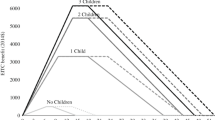Abstract.
The economic theory of marriage predicts that the partners’ expectations of greater financial resources outside of marriage should increase the probability of marital dissolution. One potential implication is that marriages should be less stable in states with higher AFDC benefits. I study this implication empirically using data on separations and divorces among marriages involving women in the National Longitudinal Survey of Youth. I find no supporting evidence that higher welfare benefits lead to increased rates of marital dissolution among married women with children.
Similar content being viewed by others
Author information
Authors and Affiliations
Corresponding author
Additional information
I thank Mary Ellen Benedict, Madeline Zavodny, and two anonymous referees for helpful comments, and Saul Hoffman for providing his data on AFDC benefits. Responsible editor: T. Paul Schultz.




